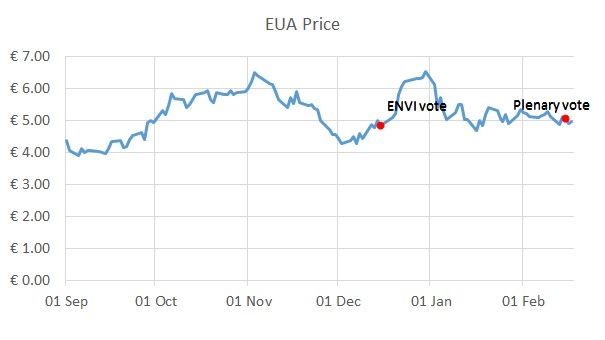01/03/2017 – In an unexpected move, the Environment Council has endorsed more ambitious EU ETS policy changes than those agreed by the European Parliament. Europe’s ETS cap in 2030 will still be out of line with the commitments the EU signed under the Paris Agreement, but we welcome the introduction of limiting the Market Stability Reserve (MSR) volume to the total number of allowances auctioned during the previous year. This means a cancellation of potentially about 3 billion tonnes from the MSR over Phase 4 – equal to almost 2 years’ ETS emissions. Much of this 3 billion tonnes would go into the MSR in 2019, and would be cancelled in 2024, although this wouldn’t impact the quantities in the market for at least a decade from today.
For immediate release, Wednesday 1st March 2017
Contact (+44) 020 3876 6451, ola@sandbag.org.uk for more information
The proposal to limit the MSR volume came from a coalition of more willing Member States, and was subsequently amended into the final Council compromise position by the Czech Republic. This proposal will not affect the surplus available to the market for a while, but it’s a good long term solution that could cancel about 3 billion tonnes of allowances from the MSR by 2030. The absence of an equivalent proposal in the European Parliament’s position (established at their mid February vote) resulted in no market price reaction: we hope to see at least some movement this time.
At the same time, the Council has supported measures to further insulate European industrial sectors from the impact of a carbon price signal, agreeing to lower the auction share of allowances by 2%. This is a smaller decrease than the European Parliament’s position, but sets a negative precedent nonetheless. And with the prospect of an increasing carbon price, the EU ETS risks continuing to serve as a scheme for industrial subsidy to certain sectors, including cement. We are also concerned that investor uncertainty around the EU ETS will be prolonged, given that the cap is still not declining at a rate that would definitely be commensurate with meeting Paris targets.
We await the Trialogues in the hope that together the EU institutions will not settle for the lowest common denominator. We are encouraged that the new package moves closer towards being a realistic policy that responds to changes in the market by cancelling surplus. Our hope is that the Trialogue discussions will be able to take this principle a step further, agreeing on a policy that is more aligned with real emissions levels from 2021 and with the objectives of the Paris Agreement. Meanwhile, ambitious Member States can still get on the front foot and strengthen today’s outcome with measures such as removing carbon allowances from their EU ETS auctions.
Rachel Solomon Williams, Managing Director at Sandbag said:
We believe that rebasing of the cap to reflect real emission levels will eventually have to happen as the most appropriate solution. But the introduction of restrictions on the volume of the MSR is a step in the right direction, reflecting solid evidence. We are happy to see that a large group of ambitious Member States has brought back leadership on climate change to the negotiations with an approach we proposed last year and have continued to support. Although MEPs rejected our amendment last year, Member States have now recognised the importance of limiting the volume of surplus in the MSR. This means that prospects for the long-term future of the ETS look much stronger.
ENDS
Notes to Editor
- About Sandbag: Sandbag is a London and Brussels-based not-for-profit think tank conducting research and campaigning for cost-effective climate policies. For more information, visit our website at sandbag.org.uk
- Absence of market’s reaction to the weak reform proposals as agreed by the European Parliament in February 2017. Source: www.quandl.com; raw data from ICE

- The expected impact of the proposal on the overall surplus of allowances could be about 3 billion tonnes. All of these allowances will be cancelled in the MSR and this provision has no impact on the surplus available to the market which we expect to be around 300Mt in 2030. For this estimate, we have used our base case emissions scenario, a doubling of the MSR withdrawal rate for 4 years and a 57% auctioning share as we do not have the final text that was adopted. Doubling of the MSR intake rate alone would not achieve such a solution, which we evidenced in our previous report the 3 Billion Tonnes Problem that can be accessed here https://sandbag.be/index.php/project/three-billion-tonne-problem/. For comparison, the Swedish proposal (co-authored by the Netherlands, Luxembourg and France) would have removed 3.2 billion tonnes.

- Sandbag still advocates that re-basing of the cap in line with emissions in 2021 is the ultimate solution to the market surplus in a short and long term. We have published our first report on that in the summer 2016, along with the report advocating for restrictions in volume of the MSR as an alternative compromise solution.
